Dive into the world of Pi-hole, the revolutionary ad-blocking software that’s taking the internet by storm. From enhancing your online privacy to supercharging your network performance, discover how Pi-hole is reshaping the way we experience the web.
Whether you’re a tech enthusiast or just someone tired of intrusive ads, this comprehensive guide unveils the magic behind Pi-hole and answers all your burning questions. Get ready to embark on a journey to a cleaner, faster, and more private digital realm!
Read further to learn more about Pi-hole, in our review we will detail its features, pros and cons with our rating, and a conclusion about why you should use it.
Click on “open” if you want to see exactly what we will talk about in the rest of this article.
Overview
What is Pi-hole?
Pi-hole is a network-wide ad blocking solution that can be installed on a supported operating system or run in a container. Instead of relying on browser plugins or individual software on each device, Pi-hole is set up in one central location, offering protection for the entire network.
This means it can block ads in unconventional places like mobile apps and smart TVs, irrespective of the device’s hardware or operating system.

One of its standout features is network-level blocking, which prevents in-app advertisements. Since ads are blocked before they’re downloaded, there’s a noticeable improvement in network performance, making it feel faster.
Additionally, Pi-hole comes with a web interface that provides a centralized place to view statistics, manage white and blacklists, and monitor domain queries across the network.
Pairing Pi-hole with a VPN can extend its ad-blocking capabilities to cellular devices, which is especially beneficial for those with limited bandwidth data plans.
Pi-hole specifications
| Features | AdBlock / DHCP server / Easy-To-Use Dashboard / Full-Featured Password Security / High-Speed Surfing / Increased Speed / List View / Long Term Statistics / Mobile-Friendly / Query Log / Whitelist / Whitelisting / Whitelisting, Blacklisting, and Regex |
| Best suited for | Individuals, Freelancers, Small businesses, Mid size businesses |
| Website languages | English |
| Website URL | Visit official website |
| Support link | Support page |
| Live chat | No |
| Company address | N/A |
| Year founded | 2022 |
Pricing
Pi-hole pricing: How much does Pi-hole cost?
Dive into our pricing structure and you’ll find a pleasant surprise : it’s absolutely free ! Pi-Hole’s team committed to providing top-notch software without the barriers of cost, ensuring everyone can benefit from our offerings.
Explore further to understand how they sustain this model and how you can support their mission.
| Pricing range | Free |
| Pricing types | Donation |
| Free plan | Yes |
| Free trial | No |
| Money back guarantee | No |
| Pricing page link | See plans |
Pi-hole pricing plans
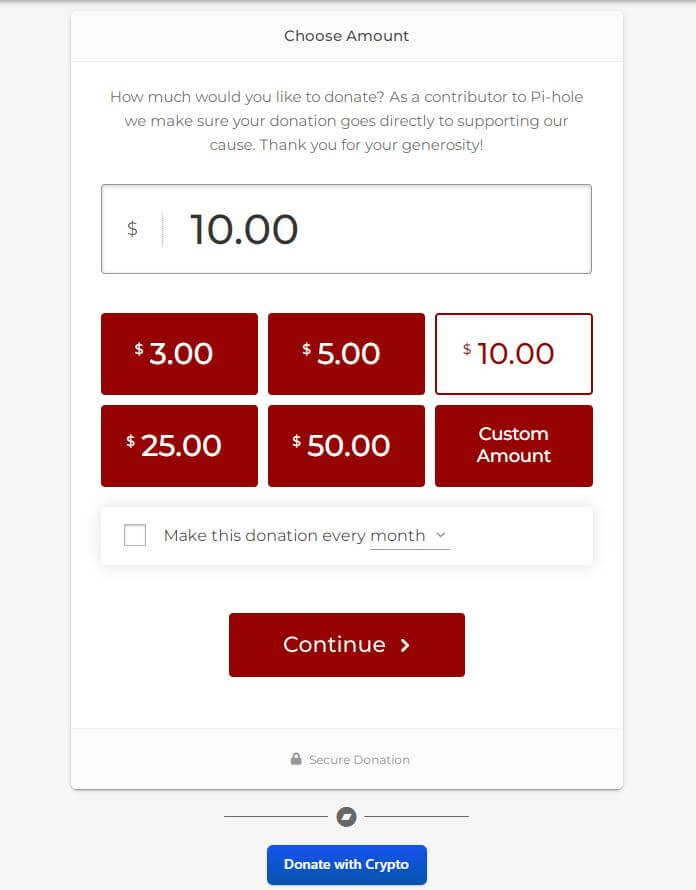
The world of open-source software is a testament to the passion and dedication of volunteer developers. These individuals often bear the brunt of recurring costs associated with maintaining such software, emphasizing their commitment to the cause.
For instance, the team of volunteers frequently covers expenses from their pockets, showcasing the depth of their belief in the software’s importance and the necessity of its upkeep.
However, the journey of maintaining free, open-source, and privacy-respecting software isn’t a solo endeavor. Community support plays a pivotal role in ensuring the software’s longevity and continuous innovation.
While financial contributions are invaluable, and donations through the Sponsor Button significantly help in managing their monthly expenses, they recognize that not everyone is in a position to donate.
For those looking for alternative ways to support, there’s a plethora of options. From backing us on platforms like GitHub Sponsors and Patreon to utilizing affiliate links such as Hetzner Cloud, Digital Ocean, Stickermule, and Amazon US.
Even actions as simple as spreading the word about the software or sharing your personal experiences can make a significant impact.
Moreover, the realm of open-source thrives on collaboration. The team wholeheartedly invite everyone to contribute, whether it’s reporting issues, suggesting features, or creating pull requests.
If you’ve spotted something amiss, be it a minor typo or envisioning a brand-new feature, they’re all ears. The only request is to utilize our template when submitting your insights, ensuring our volunteers can swiftly grasp your objectives.
Features
Pi-hole features: What can you do with it?
Pi-hole, renowned for its network-wide ad-blocking capabilities, offers a suite of features designed to enhance online privacy, optimize network performance, and provide a seamless browsing experience.
From its robust DNS filtering to its comprehensive monitoring tools, Pi-hole stands as a versatile solution for users seeking control over their digital environment. Dive into the detailed features below to discover how Pi-hole can transform your online experience.

Network-wide Ad Blocking
Pi-hole acts as a DNS sinkhole, blocking unwanted content across all devices on a network. This means that ads, trackers, and other unwanted requests are intercepted before they reach the device, ensuring a cleaner browsing experience.
Web Interface and Monitoring
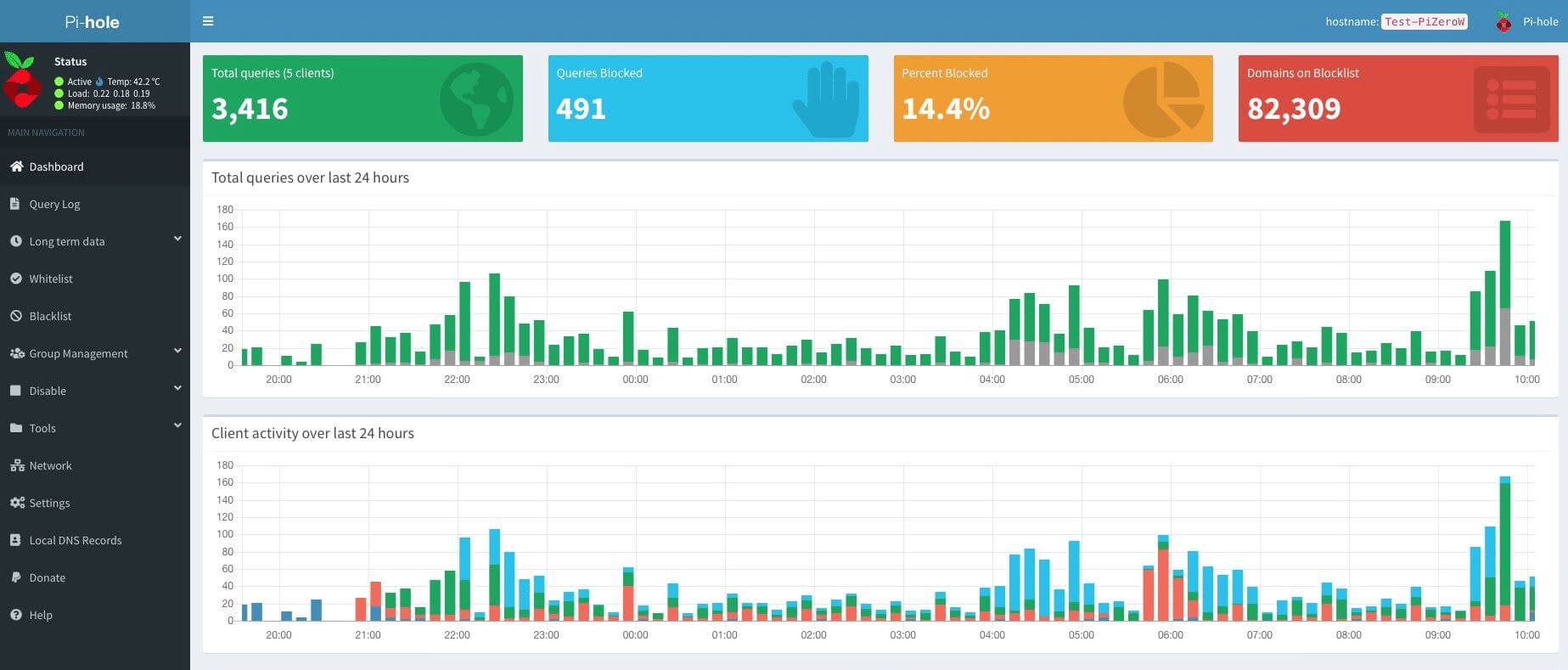
Pi-hole’s web interface is a dashboard that offers a visual representation of network activity. It displays real-time data on the number of queries processed, domains blocked, and more.
It’s also the central place for managing settings, updating blocklists, and viewing detailed statistics.
Supported Operating Systems and Containerization
Pi-hole is versatile and can be installed directly on various operating systems or run within a container. This flexibility ensures that Pi-hole can be deployed in various environments, from personal home networks to larger enterprise settings.
Built-in DHCP Server
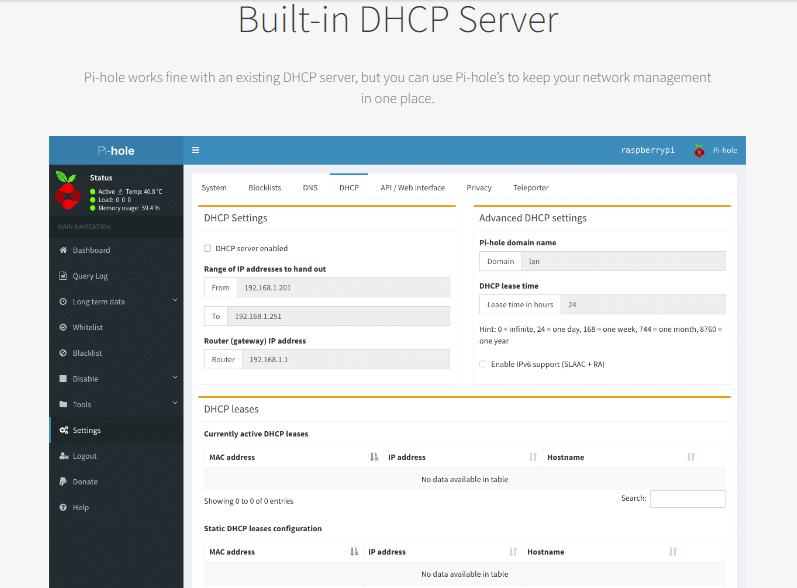
The Dynamic Host Configuration Protocol (DHCP) is responsible for assigning IP addresses to devices on a network.
While many routers come with their own DHCP servers, Pi-hole offers its own built-in DHCP server. This centralizes network management and allows for better integration with its ad-blocking features.
Improved Network Performance
Ads, especially multimedia ones, consume bandwidth. By blocking these ads before they are downloaded, Pi-hole reduces the amount of data that needs to be transmitted over the network. This leads to faster page load times and a more responsive browsing experience.
Manage White and Black Lists
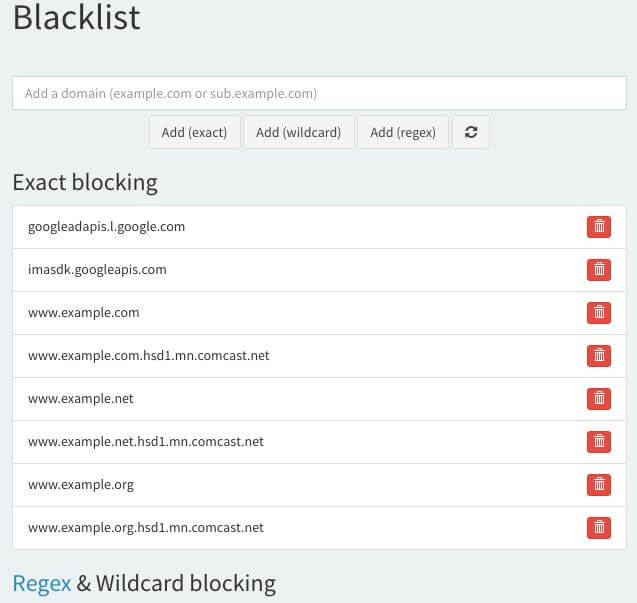
Pi-hole provides the flexibility to decide which domains to block or allow. Users can manually add or remove domains from the blacklist or whitelist, ensuring that specific websites or services are always accessible or always blocked.
Query Log
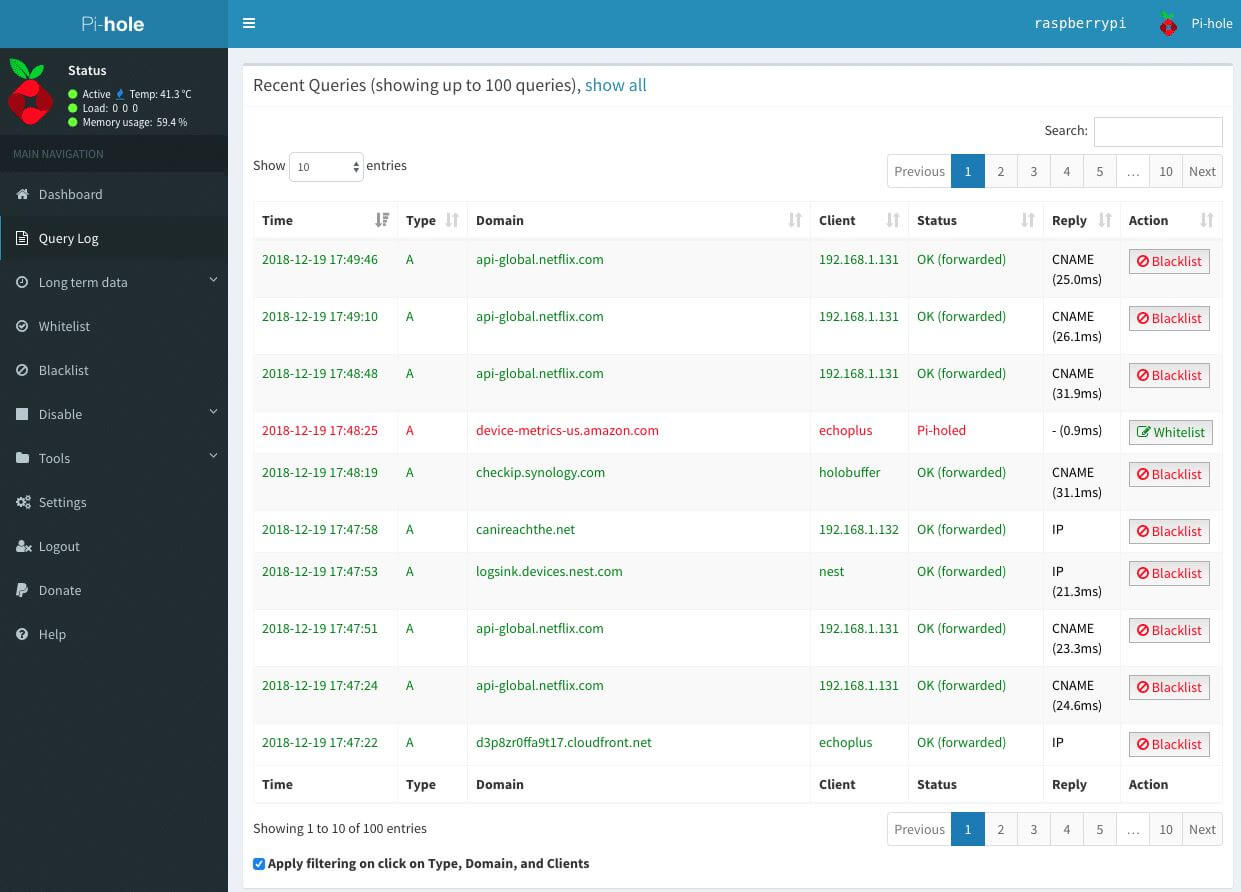
The query log is a chronological list of all domain requests made by devices on the network. It shows which domains were allowed or blocked, providing insights into network activity and potential areas of concern.
Block In-app Advertisements
Many mobile apps and smart TVs display ads that aren’t accessible via traditional browser-based ad blockers. Pi-hole’s network-level operation allows it to block these in-app advertisements, ensuring a cleaner user experience across a wider range of devices and applications.
Long Term Statistics
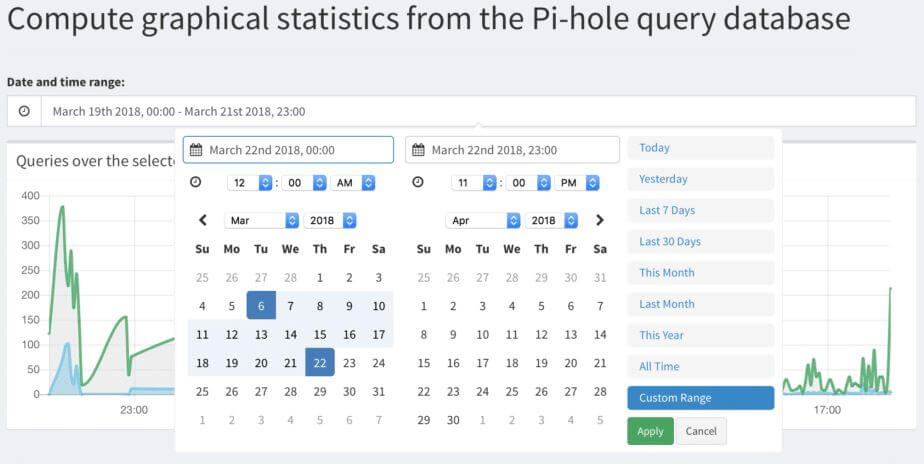
For users interested in long-term trends, Pi-hole retains domain query data. This allows for historical analysis, helping users identify patterns, peak usage times, and more.
Use as DNS Server
The Domain Name System (DNS) is a foundational internet service that translates human-friendly domain names into IP addresses that computers use to identify each other. Pi-hole acts as a custom DNS server for your network.
When a device on your network requests access to a website, Pi-hole steps in to check if the requested domain is on its list of blocked domains. If it is, Pi-hole will block the request, preventing the ad or tracker from loading. If not, it will allow the request to proceed, letting the website load as usual.
Audit Log
The audit log focuses on the most frequently queried domains, making it easier to spot and manage domains that are regularly accessed. This can be particularly useful for identifying and blocking new sources of ads or trackers.
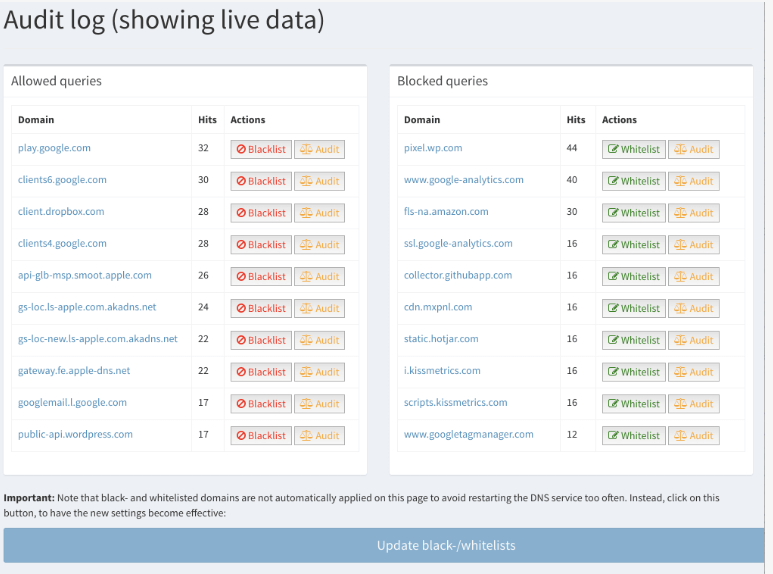
Ad Blocking on the Go with VPN
While Pi-hole is effective within the confines of a home or office network, its capabilities can be extended to mobile devices using a Virtual Private Network (VPN).
By setting up a VPN, devices can connect to the home network even when they’re away, allowing Pi-hole to block ads and trackers on cellular data or other external networks. This ensures a consistent ad-free experience regardless of location.
Privacy Modes
Privacy is paramount, and Pi-hole acknowledges this by offering different privacy modes.
These modes determine the granularity of the logged data, ranging from recording detailed logs to anonymizing data or not logging at all. Users can select the mode that best matches their comfort level and privacy needs.
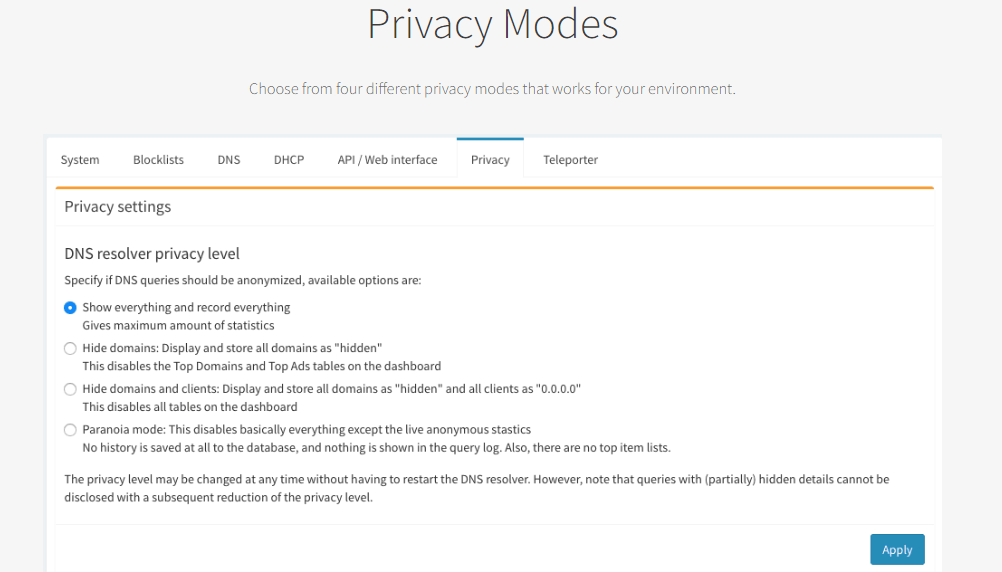
Other Settings
The web interface provides access to a range of other settings and configurations, ensuring that users can tailor Pi-hole’s operation to their specific requirements.
These features collectively make Pi-hole a powerful tool for enhancing online privacy, improving network performance, and delivering a cleaner, ad-free browsing experience.
Conclusion
Pi-hole review: Why you should use it?
Pi-hole is a powerful network-level ad-blocking software that not only blocks ads but also offers a range of features to enhance user privacy and network performance.
By acting as a Domain Name Service (DNS) server, Pi-hole filters out ad-serving domains, ensuring that ads are neither downloaded nor displayed on devices connected to your network. This results in a cleaner browsing experience without the distractions of intrusive ads.
Moreover, Pi-hole goes beyond just ad-blocking; it prevents data mining by blocking trackers that monitor your online activities. This ensures that your browsing habits remain private, and you’re not constantly bombarded with targeted ads based on your recent online searches.
Additionally, Pi-hole enhances network performance by blocking ads before they’re downloaded, saving bandwidth and speeding up page load times. It’s also effective in blocking ads on non-browser devices like smart TVs and gaming consoles.
With its ability to provide query logs, users can gain insights into the domains trying to access their network, offering a level of transparency and control. Furthermore, Pi-hole safeguards devices from potential threats by blocking malware, ransomware, and phishing domains.
Pros:
- Network-Level Adblocking: Unlike browser extensions that work on individual devices, Pi-hole blocks ads for all devices connected to the network.
- Blocks Trackers: Prevents sites from tracking your online activities, ensuring your privacy.
- Enhanced Network Performance: By blocking ads before they’re downloaded, it reduces bandwidth usage and speeds up browsing.
- Protection for All Devices: Effective in blocking ads on devices that don’t support ad-blocker installations, such as smart TVs.
- Provides Query Logs: Offers insights into the domains trying to access your network.
- Blocks Malware and Risky Sites: Protects against potential online threats.
Cons:
- No Specific Device Disabling: Pi-hole doesn’t allow disabling blocking for specific devices without manual DNS settings adjustments.
- Lack of Parental Control: If a domain is blocked for one user, it’s blocked for all users on the network.
- Potential Bypassing: Apps using DNS over HTTPs (DoH) protocol can bypass Pi-hole.
- Blank Spaces: Unlike some ad-blockers, Pi-hole leaves blank spaces where ads would have appeared.
- Dependency: If Pi-hole is turned off, internet access might be disrupted until DNS settings are reset.
FAQ

